#The ordem leader
Text
Oh fuck. Oh fuck fuck fuck fuck fuck. Jaiden. What the fuck's gonna happen to Jaiden. She may not necessarily like the Federation but. Looks like the breakdown of their relationship won't be as one sided anymore. Fuck. Oh fuck.
#qsmp#and where the fuck does that leave Roier if they fall out?#Will they not fall out?#What will that do to Cellbit's convictions?#Anyway Baghera come back and get further traumatized by watching someone with the same grievances as you (stolen childhood)#and someone so widely trusted commit such heinous acts#let the world crumble around you more until you're in pieces#The ordem leader#your best friends#your children#your family#watch them fall one by one#where will that leave you Baghera?#where will that leave you?#I feel like I should've made a separate post for this#oh well#Bad seems to be getting a little(?) better so I have to make up for it by tormenting one of my other favs
27 notes
·
View notes
Text
Despite his current issues, I still think Philza might be one of the best options for getting through to Cellbit. Philza is very mellow and there’s a lot of professional respect between the two of them as Ordem Leaders. Philza doesn’t sugarcoat issues and he is very practical about the best way to handle a situation. He’s also extremely Anti-Federation. Additionally, the old crow is both patient and stubborn and loves his friends so he would absolutely be concerned with Cellbit’s mental decline and want to help. (He does like ignoring his own problems to solve other people’s problems….)
Yes this is a long shot but I’m desperate for more Archivists content! I love when Phil and Cellbit interact! Sue me!
115 notes
·
View notes
Text
OK, so on one hand, it kinda sucks that a lot of the ex-candidates on the Island are immediately turning to rebellion instead of just talking things out with Forever. Whatever happened to Qommunication SMP
On the OTHER hand, they're pretty right about Forever not being a good person to be president. Last time he was put in a high-pressure leadership position (leader of the Ordem during Cellbit's villain arc) he,,, did not do well. Like he held the Ordem together, but just barely. It took a serious toll on Forever's mental health, so much so that he snapped under the pressure and attacked Leo. He was really happy to give leadership back to Cellbit. Now he's president of the entire ISLAND with the Feds breathing down his back? I hope I'm wrong, I love Forever, but I don't think leadership is his strong suit
#im talking about CHARACTER Forever here to be absolutely clear#i dont want any of yall thinking im talking about ccForever#qsmp#qsmp forever
47 notes
·
View notes
Text
The Holy Trinity of Fear-Entity Based Media
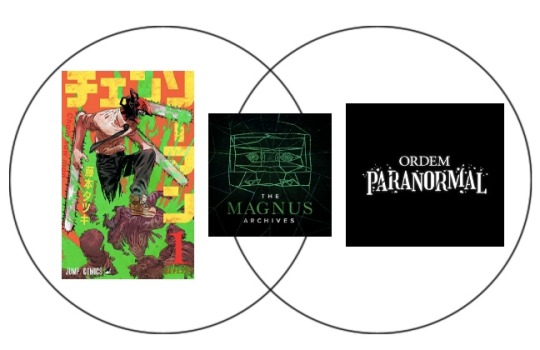
HELLO! i am returning to elaborate on this subject because i've been thinking about it for literal WEEKS ever since i made the connection while starting TMA.
So, let's explore this venn diagram in more depth, shall we?
(Apologies for the length of this post but I have MANY thoughts. I know it's long, but please hear me out lol)
First, I want to talk about the world-building similarities since they're what I first noticed and spurred this entire thing.
Imagine the following explanation in terms of the venn diagram above.
Chainsawman:
A Japanese action/horror manga
A universe where fear-based entities (called "devils") exist. Each devil correlates to the fear of a specific concept (with infinite possibilities ranging from tomatoes to the future). They are the embodiment of the fear their name represents.
Each devil thus has its own special abilities and 'theming' associated with its name.
The existences and power levels of the devils fluctuate based on what the the populace is afraid of at the time and how scared they are. They survive and feed off of human's fear.
The devils exist in another 'place' (Hell) that is separate but linked to the our world. However, they can manifest in the real world to attack and spread further fear (and if they die there, they are sent back to Hell in a weakened state). It is currently unknown as to how devils cross over from Hell.
However, the devils CAN in fact permanently die- if they are forgotten entirely by humanity (and thus run out of fear to exist/feed on)
There are a few special types of devils: 1. Primal fears, which embody ancient instinctual fears (darkness, falling) and 2. the Four Horsemen: (Control/manipulation, war, famine, and death), the most powerful of the devils.
There are also many ways that humans can serve, be linked to, and be embodiments of these devils. Beings known as "fiends" (corpses possessed by devils), cases of devil transformations (humans who make contracts with devils and are transformed into monsters to do their bidding) and "hybrids" (humans and devils fused). However each way results in great personal cost/change, like the loss of humanity.
The existence of these devils is a common, well-known fact of society, and one of the main causes of death in this world.
There is a governmental agency tasked with combating devil attacks. The main leader we interact with is a character who manipulates the protagonist throughout the entire series to help them achieve their vision for the world. They are revealed to secretly be one of the devils the characters were supposed to be fighting, and is heavily associated with eye imagery.
Ordem Paranormal
A Brazilian live-streamed horror TTRPG (table-top roleplaying game)
(Disclaimer: for this one, I have only had the chance to watch OPQ and Cellbit's onstream explanations of the lore, so I tried to supplement with the wiki as best I could without getting too spoiled. If I got anything wrong or you think I missed anything, please tell me! I'd love to get your guy's insight on this)
A universe where there are 5 elements (Death, Energy/Chaos, Blood, Knowledge, and Fear) that exist in a place separate but linked to our world known as "the Other Side."
Each element is associated with different monsters, abilities, and general characteristics. Death is associated with distortions in the passage of time, spirals, and an ultimate end. Blood is the element of intense emotions, both positive and negative. Knowledge is the element of discovering, knowing, recording. It wants to preserve balance between the elements since it likes reality as it is. Energy/Chaos is unpredictability, unreality, and transformation. It mostly serves its own entertainment. Fear is the most mysterious- it is the source of all paranormal and has existed since the dawn of humanity- it is of the unknown and the infinite.
Individuals can connect to and form pacts with each of these entities (except for Fear). They gain different supernatural abilities depending on which, but all result in great personal cost and change- usually becoming less and less human in a variety of ways.
The barrier between the two worlds can be weakened through fear. Cultists take advantage of this and attempt to perform rituals that would break the membrane and bring these entities over to our world.
These elements can also just manifest into our world in a variety of different ways, like monsters, paintings, artifacts, etc.
Tthere are independent organizations around the globe who work to prevent these rituals and maintain order. However, the existence of this "other side" and the entities is not known by the wider public.
The organization we follow is headed by an elderly character who has dedicated every single aspect of their life to fighting these elements, stopping these rituals, and maintaining the balance. However he is willing to form connections with those around him, and violence isn't always his first option.
The Magnus Archives
A British horror/tragedy podcast
A universe where entities known as "the fears" or "the dread powers" exist next to our world (separate but linked). Each entity is the embodiment of a different fear that the humans (and animals) of earth feel.
The fears are typically broad (covering multiple specific fears under a wider category) and when manifesting can blend into one another. A good analogy to explain it is the color wheel.
The single entity known as fear has been around since the beginning of the world. However, as humanity developed more complex thought, they split off into different aspects (though they are still in some ways linked).
At the time of the series there are 15 entities (a full list here). The existences and power levels of the entities fluctuate based on what the the populace is afraid of at the time and how scared they are. They survive and feed off of human's fear.
The entities can permanently die, but only if the organisms of the world did too, as there would be no more fear left for them to consume.
These fears can manifest in our world as a number of different paranormal happenings, from monsters to books. They manifest in order to cause fear to feed themselves.
Most of the entities are near mindless- they simply operate to feed, with little to no future planning (with the exception of The Spider, the fear of control and manipulation, whose entire thing is future planning.)
Individuals can connect to and form pacts with each of these entities to become individuals known as Avatars. They gain different supernatural abilities depending on which fear they connect too, but all result in great personal cost, change, and the overall loss of humanity.
Followers of the same fear often gather to form cults. When a fear gains enough power, its avatars usually attempt to perform various rituals that would manifest their entity in our world. This would result in our world transforming into a hellscape of fear for that entity to gorge itself on. (There are also two fears that do not attempt rituals as they prefer reality the way it is. )
We follow an independent organization tasked with recording and categorizing the encounters of individuals with these paranormal events. The two leaders we interact with the most are
A Character who manipulates the protagonist throughout the entire series to help them achieve their vision for the world. They are revealed to secretly be one of the Avatars the characters were supposed to be fighting, and is heavily associated with eye imagery.
An elderly character who has dedicated every single aspect of their life to fighting these entities, stopping these rituals, and maintaining the balance. (However she is unwilling to become attached to those around her, and will ruthlessly do whatever it takes to accomplish her goals.)
Ok, so if you read through these explanations you can hopefully see many of the connections that I drew. The TLDR is: these three pieces of media all feature fear-powered entities that exist in a world separate but connected to our own, but can manifest here in a variety of ways and each have their own unique theming/powers. People can form pacts and become connected to these entities and gain supernatural abilities, but that often results in the loss of their humanity. Rituals are performed by the people connected to these entities in order to manifest them more into our world. Finally, all three stories are centered around the members of an organization tasked with dealing with these entities in some way.
(Also, if you combine the world-building of CSM and OP, it basically results in the world-building of TMA, which is that thought that originally inspired this post)
However, these are just baseline world-building connections. When I first posted about the idea of this venn diagram, I got some tags from @wasabi-ribs proposing a connection between the very themes of these shows in a way I hadn't even thought about.
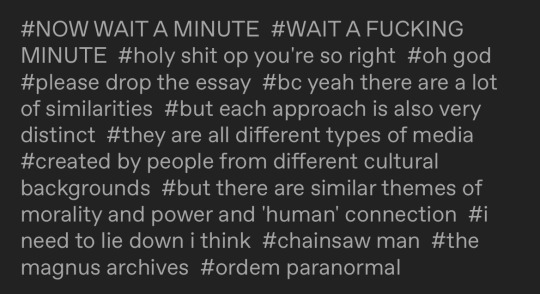
While I don't feel as though I can accurately speak to the themes of Ordem as much as the other two, I was doing some research (*cough* scrolling tumblr) and saw this post from @just-an-enby-lemon.
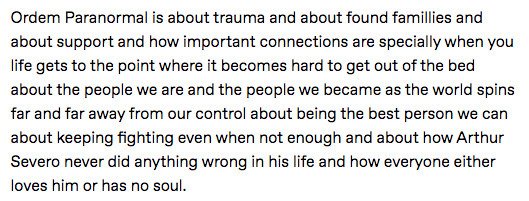
And honestly, that sounds pretty damn similar to what I consider to be the main themes of CSM and TMA, aka:
Love and connection alone can't save you, but that doesn't mean they are unimportant, especially in a world full of so much fear, trauma and loss of control and perhaps even your humanity.
Also, the general questioning of what exactly it means to be human, and my age old favorite of the indomitable human spirit even in the face of unfathomnable horror and tragedy.
What is the conclusion or point of this post? I'm not entirely sure. But I wanted to acknowledge the beauty in how such different mediums can be used by people of three completely different cultures to discuss eerily similar themes of humanity and connection (and also very spooky fear entities).
Thank you so much for reading this far and please feel free to add onto this post with anything you think I missed or got wrong. I love talking about the connections between my favorite pieces of media with people! :)
(Also, apologies if this came across as incoherent or rambly in any way, turns out it’s a lot harder to explain this in a console way in writing than to just have the thoughts floating around in your head lol)
#it’s finally here babyyyyyy#I have been thinking about this for so long so it’s nice to#finally articulate it#the Magnus archives#chainsaw man#ordem paranormal#tma#csm#clare’s tedtalks
19 notes
·
View notes
Text
Its fascinating to me how some people on the Qsmp are changing as a result of the events the server puts them in. Forever naturally gravitate towards organizing and leading groups, but its a change that happened after he became president. Having to deal with election debates, the voting system and more intense lore made him go from kind of awkward with the idea of being a leader to becoming one of the first people the others look towards for leadership, and him co-leading with Etoiles in Purgatory 1 proved that he's damn good at it.
You've also got Tubbo who struggled big time to get his team's cooperation and respect during Purgatory 1, but as a result of him constantly putting in the effort and learning from that kind of experience he not only got his team's respect way more as the event went on, but he entered Purgatory 2 ready to meet the expectations put on him as his team's leader with a lot more confidence and success right off the bat.
Quackity himself is getting a chance to really shine as a host/director to his own big events. Stuff like dsmp and creator meetups gave him smaller opportunities to organize his own projects but since the Qsmp is his server, he gets to oversee the full extent of all the workings within and its been incredibly fun and interesting watching him take the stage as a host. And he's gotten really good at it!
There's so many other examples like Baghera getting to flex her acting skills with her lore (and Ordem Paranormal!), Philza doing his own active lore where in the past he usually just went along with others' stories, Forever being scarily good at acting during Happy Pills (and saying its something he didn't do before but that he was really proud of), Bagi getting to write and push forward her own storylines, and so much more
#just wanted to share some observations#apparently minecraft servers can help you with team coordination#and other essential life skills#it can also make you mentally ill but that's neither here nor there#mcyt#qsmp
17 notes
·
View notes
Text
Round 1; Magistrada Vs Brúlio Cervero
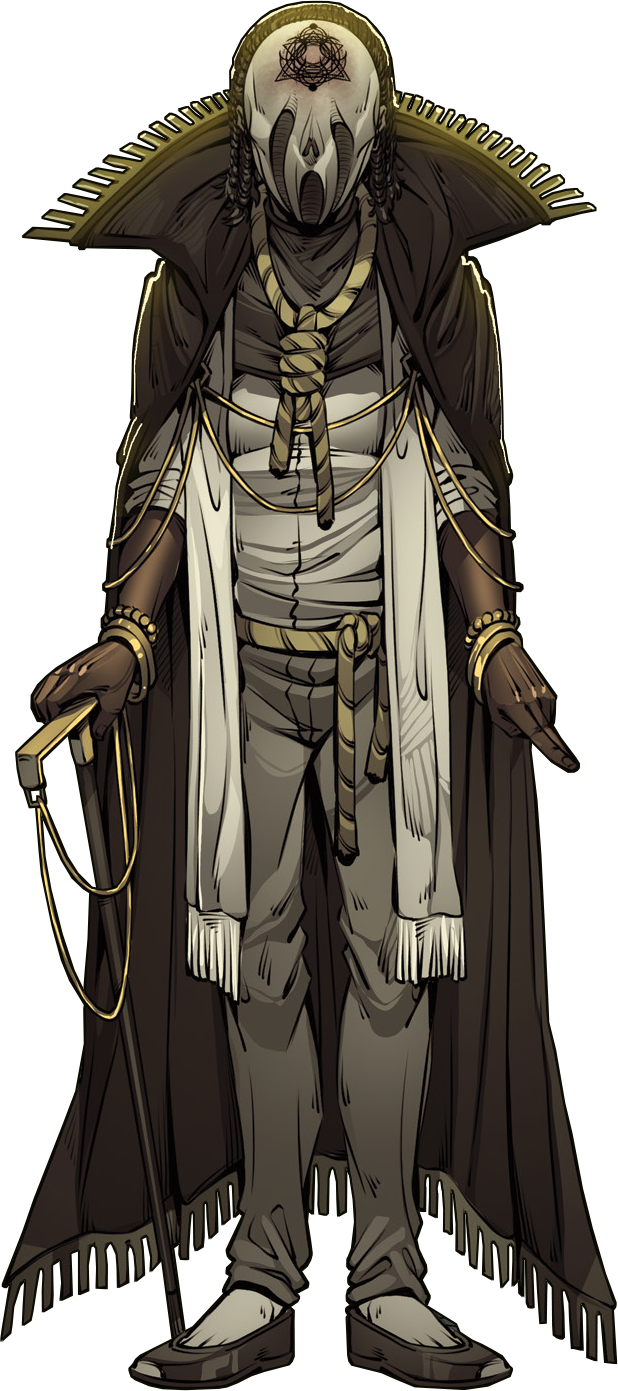
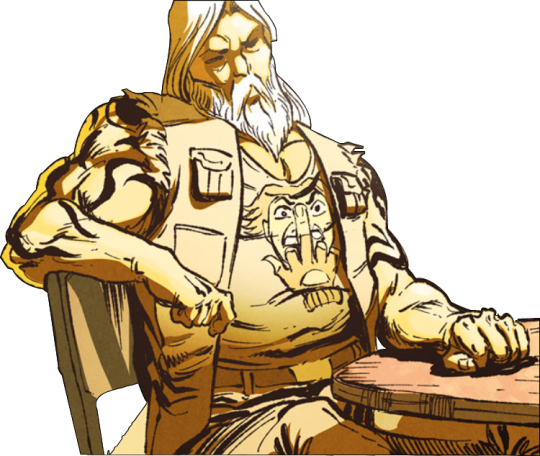
Propaganda:
Magistrada:
O PESSOAL ESQUECE ELA TANTO 😔
Brúlio:
Brulio é um líder de gangue, mó maromba com cabelo e barba gigantes, que amou e tratou todos seus membros bem e foi um ótimo pai. Existe coisa mais gostosa que um líder de gangue mó fortão com um coração de ouro?
Translation:
Magistrate:
PEOPLE FORGET HER SO MUCH 😔
Brulio:
Brulio is a gang leader, a strong guy with giant hair and beard, who loved and treated all his members well and was a great father. Is there anything hotter than a strong gang leader with a heart of gold?
19 notes
·
View notes
Text
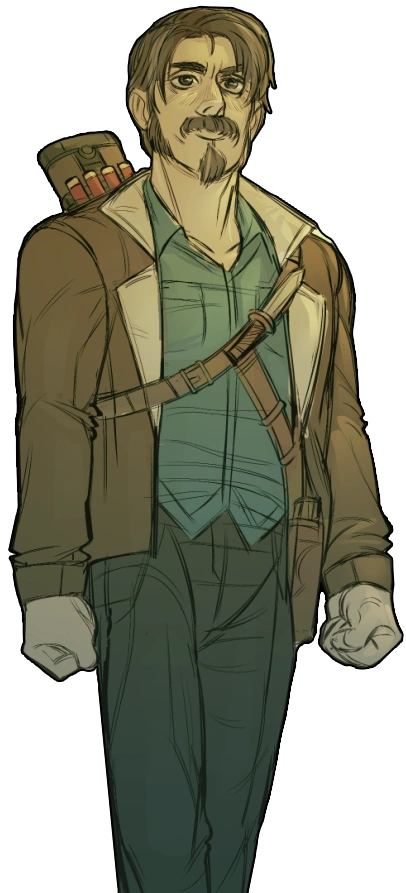
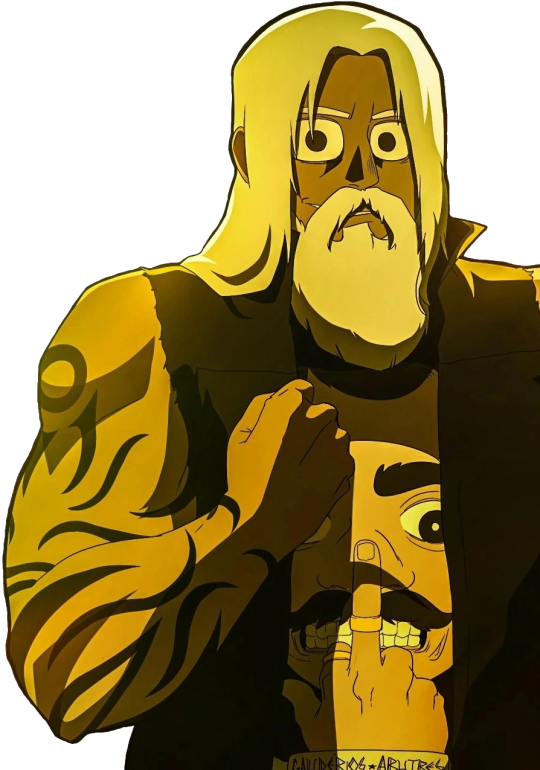
Propaganda below the cut!
Senhor Veríssimo
He's the leader of a organization that fights the paranormal. He doesn't have a name, he abandoned it, and he disappeared in the game enigma of fear (where you play as his daughter trying to find him)
He made mistakes in his past, but now he understands it, he overworks an hs daughter needs to make him go sleep sometimes and I will never forget he saying ‘Kill me’ to the main villain Kian (which made Kian get off guard for 1 turn!!).
His organization will fight for our reality.Also his theme songs are rly great
Brúlio Cervero
Father from one of the protagonists, leader of a motorbike gang, has a bar, a really cool character who could have more screentime but due to sad things he couldn't 😔
28 notes
·
View notes
Text
Since I started by explaining more general things, now I'm going to explain the Paranormal Order and the teams! Maybe a little bit of the characters
So, Ordem Paranormal means Paranormal Order, but the official name inside the lore is Ordo Realitas and its a big and secret organization with headquarters in Brazil.
The agents are divided in teams and usually they are always together to fight the paranormal.
Equipe Aniquiladores: The oldest team! The members include Senhor Veríssimo (a NPC, the Order leader), Aaron (NPC, a mysterious sniper), Balu (Played by Calango, funny guy), Arnaldo Fritz (sometimes a npc, sometimes played by Rakin, a famous actor), Chizue Akechi (a NPC, uses Katanas) and some other unknow people, now inactive;
Equipe Veterana de Varredura: Balu, Arnaldo Fritz, Johnny Tabasco (played by Alanzoka, really impulsive) and Luciano Carvalho (played by LJoga, a former military), now inactive;
Equipe Brasa: Erin Parker (played by Kalera, heavy inspired by Jinx from League of Legends), Fernando Carvalho (also played by LJoga, Luciano's husband), Luciano Carvalho and Tristan Monteiro (NPC, funny flirty guy), now inactive;
Equipe Iniciante de Varredura: The first team to be presented in the series! Its members are Alexsander Kothe (played by LJoga, a history teacher), Daniel Hartmann (played by Luba, a writer), Elizabeth Webber (played by Bagi, a medical doctor and forensic scientist) and Thiago Fritz (played by Rakin, Arnaldo's son), now inactive;
Equipe Veterana: Arnaldo Fritz, Chizue Akechi, Cristopher Cohen (played by LJoga), Francisca Parker (NPC, Erin's grandmother) and Senhor Veríssimo, now inactive;
Equipe E: Second season team! Arthur Cervero (played by Guaxinim, handsome and cute guy), Cesar Oliveira Cohen (Played by Calango, nerd and Cristopher's son), Elizabeth Webber, Joui Jouki (played by Luba, gymnast), Thiago Fritz, now inactive;
Equipe Kelvin: Kenan Thomas (played by Leo Santi), Mariana Carona (played by Bagi), Miguel Cariad (initially played by Calango, later he became a NPC), now inactive;
Equipe D: Third season team! Arthur Cervero, Beatrice Portinari (played by Triz Pariz, has a cool bird), Dante (played by Rakin, an ocultist), Elizabeth Webber, Erin Parker, Fernando Carvalho, Joui Jouki, Kaiser (Cesar Oliveira after some traumas), Luciano Carvalho, Orpheu (the cool bird!) and Tristan Monteiro, now inactive;
Dragões Metálicos: A metal band inspired by Metallica, they're all NPCs! Kurt Hemmis, Leandro Hans, Marcos Front and Roberto Lutrijo, now inactive;
Equipe Espiãs: Team inspired by Totally Spies, they're all NPCs! Alexia Grifo, Clarissa Leão and Samantha Hale, now inactive;
Dupla Johnny e Rubens: Johnny Tabasco and Rubens Naluti (played by Felps, a silly little guy), now inactive;
Equipe Abutres: Balu, Arthur Cervero, Carina Leone (played by Bagi, italian mafia girl), Dante, Joui Jouki and Rubens Naluti, still active;
Equipe Delta: NPC only team: Jiro Yukami, Naomi Akechi and Olivia Lefleur, still active;
Dupla Cavalcante e Wanderley: Cavalcante Bueno (a NPC) and Wanderley Nascimento (played by Rakin)
And also theres teams from another countries or without any contact with the Order:
Hell Hunters: Ex members from SWAT, their headquarters are in Texas, United States, all the members are NPCs. Arnold Strolley, Chloe Grey, Jason Bloom, Karen Brown, Miguel Hernandez, Roy Stevens, Ryder States, Stella Green and Troy Walker;
Obscurité: A french team of anarchists who lives in Paris' Catacombs, almost all of them are NPCs. Bernadette Leroy, Cartier Dubois, Delano Martin, Désirée Menet, Dominic Sy Pierre (played by Abelha), Emmanuelle Adrien, Lorraine Orleans, Marc Menet, Margot Renaud, Maxime Auclair, Oriel Renaud and Yuki Saito (played by Kalera);
Família Leone: Italian mafia, almost all NPCs. Alfredo Leone, Alonzo Leone, Ângela Leone, Antonella Leone, Brando Leone, Carla Leone, Carina Leone, Chiara Leone, Dario Leone, Enzo Leone, Fabrizio Leone, Giuseppe Leone, Lorenzo Leone, Marco Leone, Patrizia Leone and Roberta Leone;
Os Cinco: Team kinda based on Scooby-Doo and in sci-fi 90' movies. Xande (played by Guaxinim, impulsive and cool guy), Dara Venturini (played by Carol, team's support), Chico (played by LJoga), Guizo (played by Felps), Lírio Tellini (played by Gary, he's THE WALL), Morato Vertaler (NPC) and Voytek Nowak (NPC).
Elements | Classes | O Segredo na Ilha
42 notes
·
View notes
Text
halfway thru ep 6 of osnf (spoilers)
i am so fucking sad holy shit Brúlio. Brúliooooo. he’s been my absolute favorite side character for the whole ordem paranormal series so far. his big personality, being equal parts intimidating and friendly, so protective of those he deems under his care (his son, the bar’s patrons, briefly the ordem crew before things got rocky between them post spider-fight), unflinching in his loyalty. he loved so intensely and so fiercely, had a joyous laugh and a furious shout that could shake the walls. he was the leader of a gang, could hurt and fight and kill if he had to, but he really just wanted everyone in his little town to be happy and cared for. he trusts, loves, and supports his son even if he doesn’t fully understand, whether that be with his music career or when he ran into the bar desperate and shaken and begging for Brúlio to get everyone to leave. he won’t stand for cruelty or negligence. he’s as sturdy as a mountain in every way.
during that fight in the abandoned house, the creature mind controlled him to kill Ivan (iirc). he then shot himself* as the creature fought Arthur. and i know he was under the creature’s control, and i know the creature probably had Brúlio shoot himself because shooting at Arthur would’ve risked shooting at the creature, and the creature “almost had” Arthur anyway, so Brúlio wasn’t needed anymore…
but (because im delusional) im choosing to believe that maybe it was just a tiny bit of Brúlio coming through, knowing he’d already killed Ivan and was about to kill Arthur, and just baaaarely being able to redirect the creature’s will to turn the gun on himself—a combination of the prior mentioned factors helping ofc. does this make sense? not really, if you think about it too hard. will i die on this hill? not particularly. but idc. i just cant rn 0(-(
also literally me for the entire first hour and a half of ep 3:
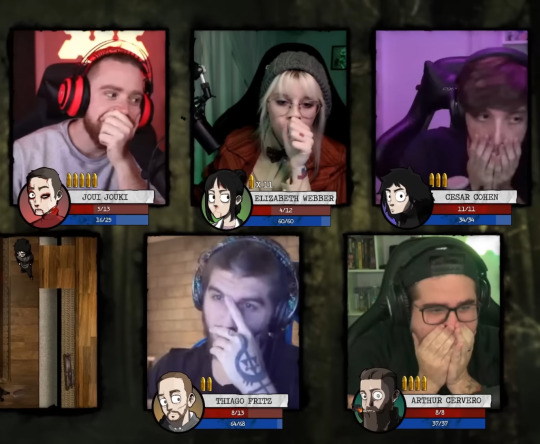
Ordem Paranormal stop killing off parents and parental characters challenge level impossible.
*(sobbing, but that was a fantastic callback with the revolver/russian roulette btw. i can wail about the character’s fate but i can still appreciate the amazing storytelling. the duality of being a writer.)
2 notes
·
View notes
Text
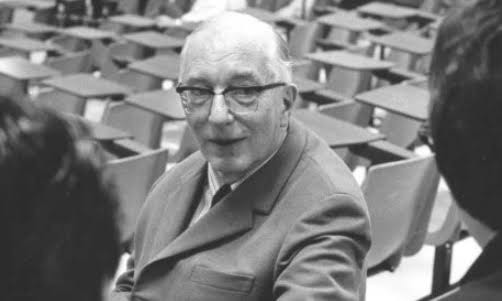
Frases de Eric Voegelin
Reunidas, traduzidas e compiladas por Cláudio Suenaga.
Eric Voegelin nasceu em Colônia em 1901 e trocou a Alemanha por Viena quando tinha 9 anos. Ele se formou em direito e ciência política, mas sua verdadeira educação, ele disse mais tarde, veio da leitura de Karl Kraus (1874–1936), o mordaz jornalista vienense cujos ataques à hipocrisia e à vulgaridade de seu tempo moldaram a geração que atingiu a maioridade por volta da Primeira Guerra Mundial. O distanciamento de Voegelin de sua pátria austríaca preparou-o para dar um passo incomum para um jovem acadêmico europeu. Em 1924 viajou para os Estados Unidos com uma bolsa e passou dois anos estudando em universidades americanas, frequentando os cursos de John Dewey (1859–1952) em Columbia e descobrindo as obras de George Santayana (1863–1952). Essa experiência inspirou seu primeiro livro, On the Form of the American Mind (1928), que deve mais a pensadores alemães como Max Scheler (1874–1928) e Wilhelm Dilthey (1833–1911) do que a pragmatistas americanos como Dewey. Ainda assim, a experiência americana de Voegelin teve grandes efeitos. Quando voltou a Viena para aceitar um cargo na universidade, trazia consigo um ódio permanente ao racismo e as vergonhosas justificativas intelectuais dele. Depois que trabalhos pseudocientíficos apoiando o racismo biológico dos nazistas começaram a circular na Áustria, ele os atacou em dois livros publicados pouco depois de Hitler tomar o poder. Esses e outros de seus escritos fizeram dele um alvo escolhido pelos nazistas austríacos, que ordenaram sua prisão imediatamente após o Anschluss em 1938. Ele escapou de trem enquanto a polícia revistava seu apartamento.
Saiba mais sobre a vida e a obra de Eric Voegelin aqui:
“Um governo tem o dever de preservar a ordem, bem como a verdade que representa; quando um líder gnóstico aparece e proclama que Deus ou progresso, raça ou dialética o ordenou para se tornar o governante existencial, um governo não deve trair sua confiança e abdicar. E esta regra não sofre exceção para governos que operam sob uma constituição democrática e uma declaração de direitos. O juiz Jackson, em sua discordância no caso Terminiello, formulou o seguinte: a Declaração de Direitos não é um pacto suicida. Um governo democrático não deve se tornar cúmplice de sua própria derrubada, deixando que os movimentos gnósticos cresçam prodigiosamente sob a proteção de uma interpretação turva dos direitos civis; e se, por inadvertência, tal movimento chegou ao perigo de capturar a representação existencial pela famosa “legalidade” das eleições populares, um governo democrático não deve se curvar à “vontade do povo”, mas reprimir o perigo força e, se necessário, quebrar a letra da constituição para salvar seu espírito”.
― Eric Voegelin, A Nova Ciência da Política, 1952.
“A government has the duty to preserve the order as well as the truth which it represents; when a Gnostic leader appears and proclaims that God or progress, race or dialectic, has ordained him to become the existential ruler, a government is not supposed to betray its trust and to abdicate. And this rule suffers no exception for governments which operate under a democratic constitution and a bill of rights. Justice Jackson in his dissent in the Terminiello case formulated the point: the Bill of Rights is not a suicide pact. A democratic government is not supposed to become an accomplice in its own overthrow by letting Gnostic movements grow prodigiously in the shelter of a muddy interpretation of civil rights; and if through inadvertence such a movement has grown to the danger point of capturing existential representation by the famous “legality” of popular elections, a democratic government is not supposed to bow to the “will of the people” but to put down the danger by force and, if necessary, to break the letter of the constitution in order to save its spirit.”
― Eric Voegelin, The New Science of Politics, 1952.
— — — — — — — — — — — — — — — — — — — — — — — — —
“O uso do método como critério da ciência abole a relevância teórica. Em consequência, todas as proposições relativas aos fatos serão promovidas à dignidade da ciência, independentemente de sua relevância, desde que resultem de um correto uso de método. Sendo o oceano dos fatos infinito, torna-se possível uma prodigiosa expansão da ciência no sentido sociológico, dando emprego a técnicos cientificistas e levando à fantástica acumulação de conhecimento irrelevante através de imensos “projetos de pesquisa” cuja característica mais interessante é o gasto quantificável que entrou em sua produção.”
― Eric Voegelin, A Nova Ciência da Política, 1952.
“The use of method as the criterion of science abolishes theoretical relevance. As a consequence, all propositions concerning facts will be promoted to the dignity of science, regardless of their relevance, as long as they result from a correct use of method. Since the ocean of facts is infinite, a prodigious expansion of science in the sociological sense becomes possible, giving employment to scientistic technicians and leading to the fantastic accumulation of irrelevant knowledge through huge “research projects” whose most interesting features is the quantifiable expense that has gone into their production.”
― Eric Voegelin, The New Science of Politics, 1952.
— — — — — — — — — — — — — — — — — — — — — — — — —
“O problema de um eidos na história, portanto, surge apenas quando uma realização transcendental cristã se torna imanentizada. Tal hipóstase imanentista do eschaton, no entanto, é uma falácia teórica”.
― Eric Voegelin, A Nova Ciência da Política, 1952.
“The problem of an eidos in history, hence, arises only when a Christian transcendental fulfillment becomes immanentized. Such an immanentist hypostasis of the eschaton, however, is a theoretical fallacy.”
― Eric Voegelin, The New Science of Politics, 1952.
— — — — — — — — — — — — — — — — — — — — — — — — —
“Quando Deus estiver invisível atrás do mundo, o conteúdo do mundo se tornará novos deuses; quando os símbolos da religiosidade transcendente são banidos, novos símbolos se desenvolvem a partir da linguagem mundana da ciência para tomar seu lugar. Como a ecclesia cristã, a comunidade mundana também tem seu apocalipse; ainda assim, os novos apocalípticos insistem que os símbolos que criam são julgamentos científicos.”
― Eric Voegelin, Modernidade sem Limites: Religiões Políticas; A Nova Ciência da Política; e Ciência, Política e Gnosticismo.
“When God is invisible behind the world, the contents of the world will become new gods; when the symbols of transcendent religiosity are banned, new symbols develop from the inner-worldly language of science to take their place. Like the Christian ecclesia, the inner-worldly community has its apocalypse too; yet the new apocalyptics insist that the symbols they create are scientific judgements.”
― Eric Voegelin, Modernity without Restraint: Political Religions; The New Science of Politics; and Science, Politics and Gnosticism.
— — — — — — — — — — — — — — — — — — — — — — — — —
“Os seres humanos vivem em sociedade política com todos os traços do seu ser, desde os traços físicos aos espirituais e religiosos. Apresentamos apenas exemplos das áreas de cultura mediterrânica e europeia ocidental, mas a tese é universal e aplica-se também às formas políticas. A comunidade política está sempre integrada no contexto global da experiência do homem do mundo e de Deus, independentemente de a esfera política ocupar um nível subordinado na ordem divina da hierarquia do ser ou de ser ela mesma divinizada. A linguagem da política é sempre entremeada pelos êxtases da religiosidade e, assim, torna-se um símbolo no sentido conciso ao deixar que experiências preocupadas com os conteúdos do mundo sejam permeadas por experiências transcendentais-divinas”.
― Eric Voegelin, Modernidade sem Limites: Religiões Políticas; A Nova Ciência da Política; e Ciência, Política e Gnosticismo.
“Humans live in political society with all traits of their being, from the physical to the spiritual and religious traits. We have only presented examples from the Mediterranean and Western European culture areas, but the thesis is universal and also applies to the political forms in the East. The political community is always integrated in the overall context of man’s experience of the world and God, irrespective of whether the political sphere occupies a subordinate level in the divine order of the hierarchy of being or whether it is deified itself. The language of politics is always interspersed with the ecstasies of religiosity and, thus, becomes a symbol in the concise sense by letting experiences concerned with the contents of the world be permeated with transcendental-divine experiences.”
― Eric Voegelin, Modernity without Restraint: Political Religions; The New Science of Politics; and Science, Politics and Gnosticism.
— — — — — — — — — — — — — — — — — — — — — — — — —
“A filosofia brota do amor de ser; é o esforço amoroso do homem perceber a ordem do ser e sintonizar-se com ela. A Gnose deseja domínio sobre o ser; para assumir o controle do ser, o gnóstico constrói seu sistema. A construção de sistemas é uma forma gnóstica de raciocínio, não filosófica.”
― Eric Voegelin, Ciência, Política e Gnosticismo in Obras Reunidas, vol. 5: Modernidade sem restrições, p.273.
“Philosophy springs from the love of being; it is man’s loving endeavor to perceive the order of being and attune himself to it. Gnosis desires dominion over being; in order to seize control of being the Gnostic constructs his system. The building of systems is a gnostic form of reasoning, not a philosophical one.”
― Eric Voegelin, Science, Politics, and Gnosticism in The Collected Works, Vol. 5: Modernity Without Restraint, p.273.
— — — — — — — — — — — — — — — — — — — — — — — — —
“A natureza de uma coisa não pode ser mudada; quem tenta “alterar” sua natureza a destrói. O homem não pode se transformar em um super-homem; a tentativa de criar um super-homem é uma tentativa de assassinar o homem. Historicamente, o assassinato de Deus é não seguido pelo super-homem, mas pelo assassinato do homem: o deicídio dos teóricos gnósticos é seguido pelo homicídio dos praticantes revolucionários.”
― Eric Voegelin, Ciência, Política e Gnosticismo, 1959.
“The nature of a thing cannot be changed; whoever tries to “alter” its nature destroys the thing. Man cannot transform himself into a superman; the attempt to create a superman is an attempt to murder man. Historically, the murder of God is not followed by the superman, but by the murder of man: the deicide of the gnostic theoreticians is followed by the homicide of the revolutionary practitioners.”
― Eric Voegelin, Science, Politics, and Gnosticism, 1959.
— — — — — — — — — — — — — — — — — — — — — — — — —
A repetição ajuda!
“… a desordem espiritual de nosso tempo, a crise civilizacional de que todos falam tão prontamente, não deve de forma alguma nascer como um destino inevitável; que, ao contrário, cada um possui os meios de superá-la em sua própria vida… E nosso esforço deve indicar não só os meios, mas também como empregá-los. Ninguém é obrigado a tomar parte nas crises espirituais da sociedade, ao contrário, todos são obrigados a evitar a loucura e viver sua vida em ordem. “
― Eric Voegelin, Ciência, Política e Gnosticismo, 1959.
Repetita iuvant!
“…the spiritual disorder of our time, the civilizational crisis of which everyone so readily speaks, does not by any means have to be born as an inevitable fate; that, on the contrary, everyone possesses the means of overcoming it in his own life. And our effort should not only indicate the means, but also how to employ them. No one is obliged to take part in the spiritual crises of society; on the contrary, everyone is obliged to avoid the folly and live his life in order.”
― Eric Voegelin, Science, Politics, and Gnosticism, 1959.
— — — — — — — — — — — — — — — — — — — — — — — — —
“O Deus que brinca com o homem como uma marionete não é o Deus que se torna homem para ganhar sua vida sofrendo sua morte. O movimento que engendrou a história salvadora da divina encarnação, morte e ressurreição como resposta à questão da vida e a morte é consideravelmente mais complexa do que a filosofia clássica; é mais rica pelo fervor missionário de seu universalismo espiritual, mais pobre por sua negligência do controle noético; mais ampla por seu apelo à humanidade inarticulada do homem comum; mais restrita por seu viés contra o articulado sabedoria dos sábios; mais imponente por seu tom imperial de autoridade divina; mais desequilibrado por sua ferocidade apocalíptica, que leva a conflitos com as condições de existência do homem em sociedade; mais compacto por sua generosa absorção de estratos anteriores da imaginação mítica, especialmente por a recepção da historiogênese israelita e a exuberância da operação de milagres; mais diferenciada pela experiência intensamente articulada de ação amorosa-divina na iluminação da existência com a verdade. A compreensão dessas complexidades pelas quais o movimento do evangelho difere do movimento da filosofia clássica, porém, não pode ser avançada usando tais dicotomias tópicas como filosofia e religião, metafísica e teologia, razão e revelação, razão natural e sobrenaturalismo, racionalismo e irracionalismo, e assim por diante.”
― Eric Voegelin, CW VOL 12, O Evangelho e a Cultura, § III, p. 189.
“The God who plays with man as a puppet is not the God who becomes man to gain his life by suffering his death. The movement that engendered the saving tale of divine incarnation, death, and resurrection as the answer to the question of life and death is considerably more complex than classic philosophy; it is richer by the missionary fervor of its spiritual universalism, poorer by its neglect of noetic control; broader by its appeal to the inarticulate humanity of the common man; more restricted by its bias against the articulate wisdom of the wise; more imposing through its imperial tone of divine authority; more imbalanced through its apocalyptic ferocity, which leads to conflicts with the conditions of man’s existence in society; more compact through its generous absorption of earlier strata of mythical imagination, especially through the reception of Israelite historiogenesis and the exuberance of miracle working; more differentiated through the intensely articulate experience of loving-divine action in the illumination of existence with truth. The understanding of these complexities by which the gospel movement differs from the movement of classic philosophy, though, cannot be advanced by using such topical dichotomies as philosophy and religion, metaphysics and theology, reason and revelation, natural reason and supernaturalism, rationalism and irrationalism, and so forth.”
― Eric Voegelin, CW VOL 12, The Gospel and Culture, § III, p. 189.
— — — — — — — — — — — — — — — — — — — — — — — — —
“A Filiação divina não é revelada por meio de uma informação oferecida por Jesus, mas por meio da resposta de um homem à presença plena em Jesus do mesmo Deus Desconhecido por cuja presença ele é movido incoativamente em sua própria existência. O Deus Desconhecido entra no drama da passagem do reconhecimento de Pedro como a terceira pessoa. A fim de estabelecer a distinção entre revelação e informação, bem como evitar o descarrilamento de uma para a outra, o episódio termina com o encargo de Jesus aos discípulos “para não dizer a ninguém que ele era o Cristo” (Mateus 16:20).”
― Eric Voegelin, CW VOL 12, The Gospel and Culture, § III, pp.201–202.
“The divine Sonship is not revealed through an information tendered by Jesus, but through a man’s response to the full presence in Jesus of the same Unknown God by whose presence he is inchoatively moved in his own existence. The Unknown God enters the drama of Peter’s recognition as the third person. In order to draw the distinction between revelation and information, as well as to avoid the derailment from one to the other, the episode closes with the charge of Jesus to the disciples “to tell no one that he was the Christ”(Matt. 16:20).”
― Eric Voegelin, CW VOL 12, The Gospel and Culture, § III, pp.201–202.
— — — — — — — — — — — — — — — — — — — — — — — — —
“A política gnóstica é autodestrutiva na medida em que seu desrespeito pela estrutura da realidade leva a uma guerra contínua.”
“Gnostic politics is self-defeating in so far as its disregard for the structure of reality leads to continuous warfare.”
— — — — — — — — — — — — — — — — — — — — — — — — —
“Este sistema de guerras em cadeia só pode terminar de duas maneiras: ou resultará em horríveis destruições físicas e concomitantes mudanças revolucionárias da ordem social além de suposições razoáveis; ou, com a mudança natural de gerações, levará ao abandono do sonho gnóstico antes que o pior aconteça.”
“This system of chain wars can end only in two ways: either it will result in horrible physical destructions and concomitant revolutionary changes of social order beyond reasonable guesses; or, with the natural change of generations, it will lead to the abandoning of Gnostic dreaming before the worst has happened.”
— — — — — — — — — — — — — — — — — — — — — — — — —
“O interesse público deslocou-se da natureza do homem para a natureza da natureza e para as perspectivas de dominação que sua exploração abriu; e a perda de interesse se transformou até em ódio quando a natureza do homem se mostrou resistente às mudanças sonhadas por intelectuais que querem somar o domínio da sociedade e da história ao domínio da natureza”.
“The public interest has shifted from the nature of man to the nature of nature and to the prospects of domination its exploration opened; and the loss of interest even turned to hatred when the nature of man proved to be resistant to the changes dreamed up by intellectuals who want to add the lordship of society and history to the mastery of nature.”
— — — — — — — — — — — — — — — — — — — — — — — — —
“As pessoas podem deixar que o conteúdo do mundo cresça de tal forma que o mundo e Deus desapareçam atrás dele, mas não podem eliminar a problemática de sua existência. Ele vive em cada alma individual, e quando Deus se torna invisível atrás do mundo, então o conteúdo do mundo se torna novos deuses; quando os símbolos da religiosidade supramundana são banidos, novos símbolos desenvolvidos a partir da linguagem científica interior mundana tomam seu lugar”.
“Die Menschen können den Weltinhalt so anwachsen lassen, daß Welt und Gott hinter ihm verschwinden, aber sie können nicht die Problematik ihrer Existenz aufheben. Sie lebt in jeder Einzelseele weiter, und wenn Gott hinter der Welt unsichtbar geworden ist, dann werden die Inhalte der Welt zu neuen Göttern; wenn die Symbole der überweltlichen Religiosität verbannt werden, treten neue, aus der innerweltlichen Wissenschaftssprache entwickelte Symbole an ihre Stelle.”
— — — — — — — — — — — — — — — — — — — — — — — — —
Collected Works of Eric Voegelin #5
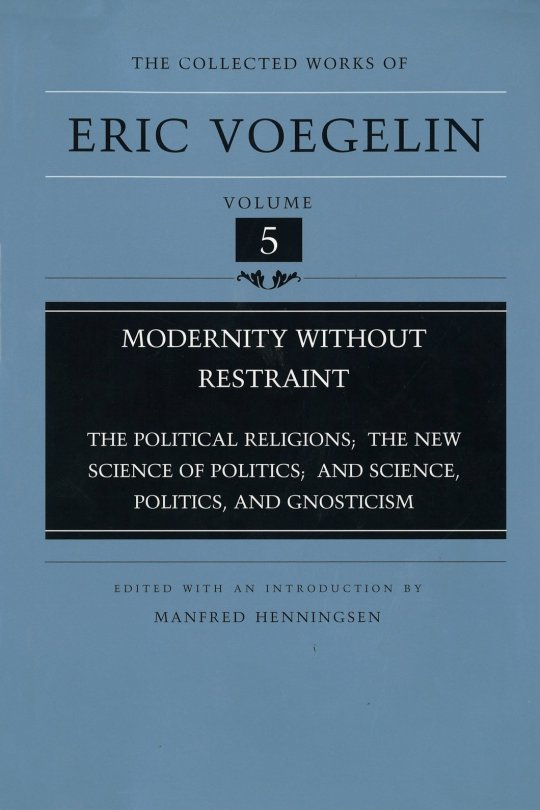
Modernity without Restraint: Political Religions; The New Science of Politics; and Science, Politics and Gnosticism
Eric Voegelin, Manfred Henningsen (Editor)
Publicados juntos pela primeira vez no volume A Religião como Política, A Nova Ciência da Política; e Ciência, Política e Gnosticismo, foi publicado pela primeira vez em 1938 em Viena, o ano da emigração forçada de Voegelin da Áustria para os Estados Unidos Estados. The New Science of Politics foi escrito em 1952 e estabeleceu a reputação de Voegelin como um filósofo político na América. Ciência, política e gnosticismo foi a palestra inaugural de Voegelin na Universidade de Munique em 1958 e o apresentou ao público intelectual da Alemanha Ocidental.
Embora esses livros tenham sido escritos durante circunstâncias históricas notavelmente diferentes da vida de Voegelin, todos os três apresentam uma análise da civilização ocidental moderna que perdeu seus fundamentos espirituais e é desafiada por várias convicções ideológicas. Voegelin critica nesses textos uma “modernidade sem freio”. É uma modernidade com características hegelianas, marxistas, nietzscheanas, heideggerianas, positivistas, fascistas e outras predominantemente alemãs. O autor confronta essa modernidade com significado ocidental tal como surgiu na Grécia antiga, Roma, Israel e no cristianismo e se transformou na Idade Média européia, no Renascimento italiano e na formação política anglo-americana.
Este volume três em um investiga as complicações intelectuais e espirituais da modernidade, traçando sua evolução desde as civilizações antigas até o século XX. Em sua nova introdução substancial, Manfred Henningsen explora o pano de fundo experimental que motivou as análises teóricas de Voegelin e a nova relevância que seu trabalho ganhou nos últimos anos com o colapso inesperado do socialismo de estado na Alemanha Oriental, Europa Oriental e União Soviética. Modernity without Restraint será um valioso acréscimo à história intelectual e aos estudos de Voegelin.
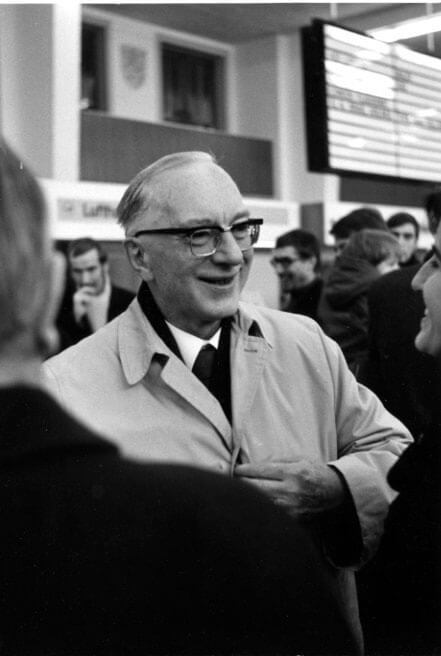
Cláudio Suenaga é mestre em História pela Universidade Estadual Paulista (Unesp), onde defendeu a primeira dissertação de mestrado sobre o Fenômeno OVNI no Brasil. Colaborador de inúmeras revistas e escritor com cinco livros publicados, milita como jornalista investigativo à caça de civilizações desaparecidas, cidades perdidas, monumentos megalíticos, tecnologia avançada antiga, fenômenos ufológicos, paranormais, milagrosos e sobrenaturais, seitas messiânicas, milenaristas e satânicas, sociedades secretas e todo tipo de teorias conspiratórias e mistérios em geral.
Ajude-me no Patreon: https://www.patreon.com/suenaga
Inscreva-se no meu Canal no YouTube: https://www.youtube.com/ClaudioSuenaga
Site Oficial: https://claudiosuenaga.yolasite.com
Blog Oficial: https://www.claudiosuenaga.com.br/
Facebook (perfil): https://www.facebook.com/ctsuenaga
Facebook (página Expondo a Matrix): https://www.facebook.com/clasuenaga
Instagram: https://www.instagram.com/claudiosuenaga
Pinterest: https://br.pinterest.com/claudiosuenaga
Twitter: https://twitter.com/suenaga_claudio
GETTR: https://gettr.com/user/suenaga
LINKS PARA ADQUIRIR OS MEUS LIVROS
Contatados: Emissários das Estrelas, Arautos de uma Nova Era ou a Quinta Coluna da Invasão Extraterrestre?
50 Tons de Greys: Casos de Abduções Alienígenas com Relações Sexuais — Experiências Genéticas, Rituais de Fertilidade ou Cultos Satânicos?
Illuminati: A Genealogia do Mal
Corona V de Vorazes: A Pandemia da Revolução 4.0
As Raízes Hebraicas da Terra do Sol Nascente: O Povo Japonês Seria uma das Dez Tribos Perdidas de Israel?
2 notes
·
View notes
Text

originally for lamb jam on newgrounds! also on twitter and instagram, click read more for rambling about this piece and alternates :3
ok so first of all, this is 100% inspired by some of my friends! I am part of a fan project of a rpg campain called "ordem paranormal" (lit paranormal order, I've posted one fanart about it here once) where we subtitle it in both PTBR and ENG and I've became really close to the small group who I've been working with, and not long ago they joked about making a cult/new religion and, well. I took the idea and ran with it. almost literally
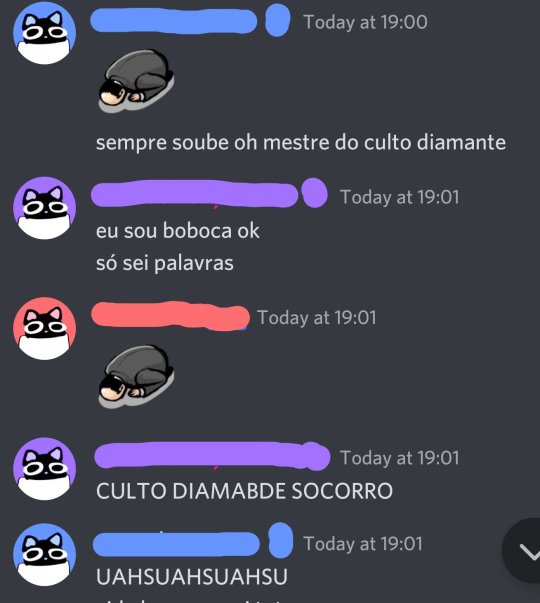
blue: always knew it oh master of the diamond cult
me: (talking abt the game we were having) DIAMOND CULT HELP
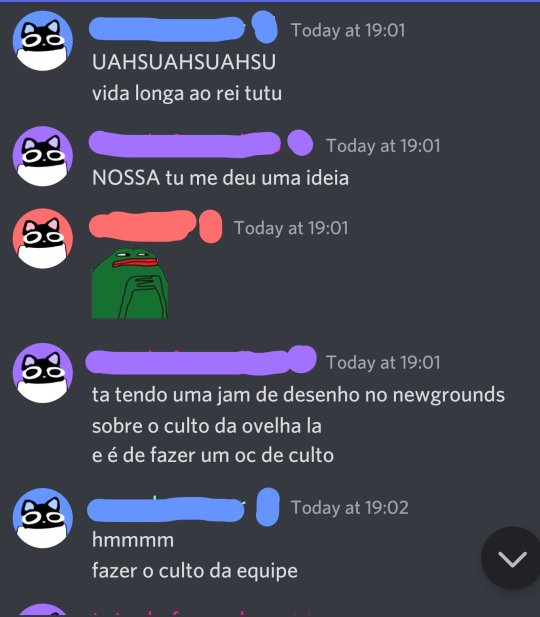
blue: LOL long live king tutu
me: WAIT you just gave me an idea. there's an art jam happening on newgrounds about the lamb cult game, and it's to make an cult oc
blue: hmmmm make a cult of the team
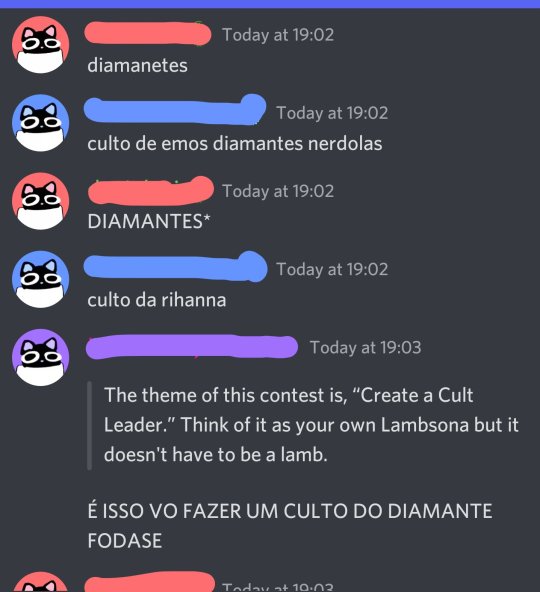
red: the diamondettes
blue: cult of the nerd diamond emos
red: *the diamonds blue: cult of rihanna
me: [pastes the rules of the jam] THAT'S IT I'M MAKING A CULT OF THE DIAMOND FUCK IT
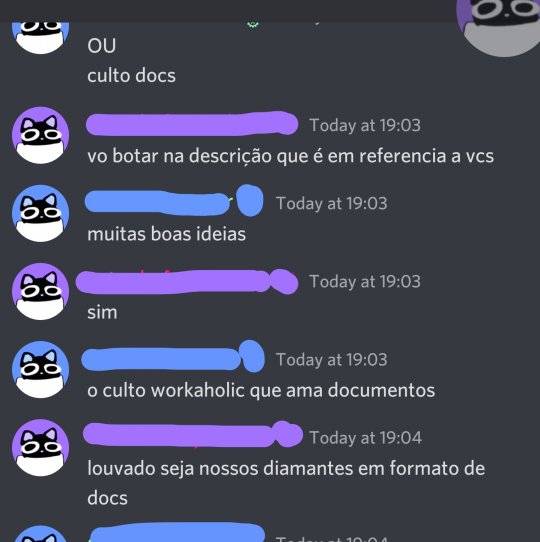
blue: OR cult of the docs
me: then I'll mention it's because of you in the description
blue: so many great ideas
me: yes
blue: the workaholic cult who loves docs
me: praise our diamond shaped docs
so here is why everyone are cats and also why there's diamonds and the google docs symbol around. another thing to mention is the long pants of the leader but it's too much of an inside joke to properly explain the symbols on the screen are actually related to the campain, they're called sigils of the other side and the fanmade font can be found here. not only it's in portuguese, but it's inside jokes so I won't bother translating it all, but I had to do it to add an extra flavour of the origin of the group circle (the damned rpg campain)
another thing worth mentioning but not related to the group, is that this was the first time I painted in greyscale and tried caring for the tones and all, then added the colour later which was just a single colour either way so. yeah, that was an interesting approach because I'm used to not care about the values at all and just bother about how the colours look besides that. so yeah lol here are alt vers


the green is because it's the colour of our team in the project
I think the drawing is kinda. eh but I am quite proud of it so fuck it, take it and I hope yall like it! also the group I've been mentioning all this time is equipe t, despite most tweets being in portuguese, they have tweets in english about the project and the rpg campain as well so, if you're interested about it, give it a go!!!
5 notes
·
View notes
Text
Fuck it, posting my tags separately because she deserves it
Anyway Baghera come back and get further traumatized by watching someone with the same grievances as you (stolen childhood) and someone so widely trusted commit such heinous acts let the world crumble around you more until you're in pieces The ordem leader your best friends your children your family watch them fall one by one where will that leave you Baghera? where will that leave you?
18 notes
·
View notes
Text
Nobre Ordem para a Excelência Humana - NOHE 🇧🇷
---
Agradecimento Especial
Caros membros da Nobre Ordem para a Excelência Humana (NOHE),
É com imensa gratidão 🫂 e alegria que nos dirigimos a cada um de vocês para expressar nossa sincera apreciação por sua generosidade e compromisso incansável com a missão nobre que abraçamos.
Juntos, como uma comunidade dedicada à excelência humana, alcançamos feitos extraordinários que impactaram ❣️ positivamente a vida de inúmeras crianças.
🫂 🕯️ Àqueles que contribuíram com doações, queremos estender nosso mais profundo agradecimento. Suas generosas contribuições foram a força vital que impulsionou nossos esforços em prol das crianças necessitadas. Cada centavo investido foi transformado em oportunidades, esperança e um futuro mais brilhante para milhões de pequenos corações ao redor do mundo.
Aos voluntários 👏 dedicados, cujo espírito altruísta e paixão moldaram nossas iniciativas, expressamos nossa mais sincera gratidão. Seu tempo e esforço foram fundamentais para a concretização de projetos que impactaram diretamente a qualidade de vida das crianças menos afortunadas.
💯 Vocês são verdadeiros heróis, e a comunidade NOHE floresce graças à sua dedicação.
❇️ Aos amigos e apoiadores, que, com amizade e compromisso, fortaleceram os alicerces da NOHE, enviamos nosso reconhecimento caloroso. Vocês são parte fundamental da teia de solidariedade que torna possível nosso trabalho. Suas conexões e apoio contínuo são inestimáveis e fundamentais para o alcance de nossos objetivos.
#️⃣ Juntos, como uma família NOHE, demonstramos que a excelência humana é mais do que uma aspiração; é uma jornada coletiva que transforma vidas. Continuaremos a trilhar este caminho, guiados por valores de compaixão, igualdade e oportunidade para todos.
✨ Que este agradecimento alcance cada coração que contribuiu para o nosso sucesso. Juntos, construímos um legado de impacto positivo e esperança duradoura.
🫶 Com profundo apreço,
Ida Bogado
Presidente e CEO
Nobre Ordem para a Excelência Humana (NOHE)
#CEO #Charity #Inspire #Clothes #Charites #NoheInfancia #NoheInnocenza #Liderança #Gestão #Brasil #Fortakeza #RJ #DesenvolvimentoDeLiderança#EmployeeEngagement #Leaders #People #LeaderShipFirst #SP

#LeadersmShipFirstQuotes #ExecutiveSandManagement #Inspiration #Empreendedorismo
0 notes
Note
[THE EMPEROR] - Is your muse a leader? If so, what kind of leader are they? Do they take a hands-off approach, or do they micromanage?
OOC: Jochem é um excelente líder, na verdade o seu maior talento é o da liderança, o fato de ser observador e atencioso faz com que ele perceba as falhas e consiga resolver de forma imediata. Também é do tipo que gosta de aproveitar o lado bom de cada um, sabe como manter o trabalho em equipe e manter a ordem também, porque militar tem que saber fazer isso. Jochem é uma pessoa que procura uma abordagem mais tranquila, até em meio a conflitos, ele procura a forma mais suave de levar a situação.
0 notes
Text
instagram
Soooo "ordem da fénix" (phoenix) ain't so much a stone but an upgraded stone.. for example some ordem da fenix was people like salazar and saramago.. now you have some lions doing it but some jesus of west virgina did it before.. this only means that this person has the power to be a leader like snoop dogg... everybody loves him and sees him as the dumbledore of our hierarquia
1 note
·
View note